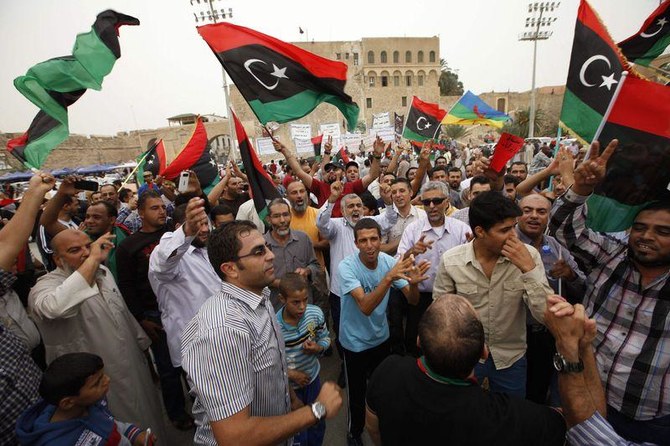Libya’s first election since a peace deal was struck last year between its warring parties may not be the end of the conflict in the country because the underlying issues that sparked a war in 2015 have not yet been addressed, a panel of experts said.
Speaking at an online event on Thursday, hosted by the Council for Arab-British Understanding, and attended by Arab News, Libyan activists and policy experts also said the intransigence of the international community, including the UN, threatens to undermine the pursuit of real resolution to Libya’s problems.
The first elections since the end of the war between the Tripoli-based Government of National Accord and Benghazi-based Libyan National Army are scheduled for Dec. 24.
But, according to Asma Khalifa, a Libyan peace activist, there remains no consensus on the core question between officials from the era of former Libyan leader Muammar Gaddafi and institutions in a post-Ghaddafi Libya.
“The biggest problem is the Political Isolation Law,” said Khalifa, referring to the proposed law that bars Ghaddafi-era officials, such as LNA general Khalifa Haftar, from participating in a post-war Libyan government.
The proposed Political Isolation Law was a major source of discontent in late 2014 and early 2015 and ultimately contributed to the breakdown of Libya’s first unity government.
“It is not clear really what happens to this law,” under the second unity government, which was agreed earlier this year, Khalifa said.
“No one mentions it anymore, especially with court cases involving head Ghaddafi figures being dismissed and the release of prisoners as part of reconciliation efforts by the government.”
This lack of clarity over the law, Khalifa said, exists in all legal texts since 2012 and “is the biggest problem.”
She also explained that various legal reforms have concentrated power in the position of president in Libya, at the expense of the prime minister and other bodies, as well as allowed senior leaders from fighting factions to run for the position.
These reforms further undermine the peace process, said Tarek Megersisi, senior policy fellow at the European Council on Foreign Relations.
“All of Libya’s old war criminals could run for this office of absolute power, of no real clear and equal mandate or restrictions. It has no wider political governance or political framework attached to it — and then simply be able to return to their barracks should they lose,” Megerisi said.
“You could argue that such a play was designed to provoke outrage and designed to provoke opposition and stop the electoral process, rather than to make it happen.”
Despite the problems with the legal reforms, Megerisi said, the UN and other members of the international community quickly embraced the legal changes in the pursuit of a December election to demonstrate the success of the international effort in Libya.
But their singular pursuit of an election above a true political resolution to the country’s deep divides represents a major flaw in their strategy, he said.
“If you go to some of these keys officials, like the UN’s (Libya) special envoy Ján Kubiš, or key capitals like Washington D.C. or Paris, then you might think that the future is actually quite bright,” Megerisi said. “Because they are all adamant that elections will be held on Dec. 24. And logistically speaking, that is indeed tentatively possible.
“Meanwhile the political or substantive problems at play are nonchalantly dismissed by a simplistic and dubious legal process whereby (members of the international community) say that the risk of having elections is less than the risk of not having them on that specific date.”
But he warned: “Because the roadmap (to peace) ends on the elections of that day, there is not much thinking that has been given to the day after the date.”

